|
|
|
Sort Order |
|
|
|
Items / Page
|
|
|
|
|
|
|
| Srl | Item |
| 1 |
ID:
178603
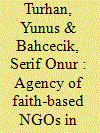

|
|
|
|
|
| Summary/Abstract |
While Turkish faith-based NGOs have been involved in delivering humanitarian aid for two decades, the relations of these organizations with the state have not received adequate scholarly attention. The main purpose of this article is to address this gap by asking what roles NGOs play in Turkey's humanitarian aid policy and practice. Despite the relative isolation of Turkey's administrative structure as a result of a strong state tradition, this paper shows that NGOs attempt to play political roles in Turkish foreign policy. The study relies on an analytical framework derived from constructivism to examine the agenda-setting and information-providing activities of Turkish NGOs between 2004 and 2016. Based on findings from a series of semi-structured interviews with 25 respondents from nine different NGOs and three state institutions, this artilce expands the research agenda on Turkey's foreign aid and shows that NGOs function as knowledge-providers, powerful catalysts for humanitarian aid activities, and influential voices in bringing humanitarian issues to light.
|
|
|
|
|
|
|
|
|
|
|
|
|
|
|
|
| 2 |
ID:
149421
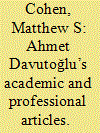

|
|
|
|
|
| Summary/Abstract |
International relations theories have sometimes been criticized as being focused on a narrow set of ideas and values. This article provides a means by which this problem can be addressed by examining the theories of former Turkish Prime Minister Ahmet Davutoğlu, who, prior to joining the government, was an international relations scholar. The article argues that gaining a greater understanding of Davutoğlu’s academic and professional publications is valuable not only to scholars interested in studying Turkey, but also to the study of international relations. Distinguishing him from other thinkers, Davutoğlu’s models are a combination of Islamic values, civilizational theories, and constructivism.
|
|
|
|
|
|
|
|
|
|
|
|
|
|
|
|
| 3 |
ID:
176573
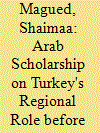

|
|
|
|
|
| Summary/Abstract |
This article examines scholarship from the Arab world on Turkish foreign policy since the early 1980s to show shifts in Arab perceptions of Turkey. Prior to 2002, Arab scholars were focused on the competition between Turkey's secular and religious elites, with largely negative views of the country's policies in the Middle East. With the rise of the Justice and Development Party (AKP), Arab scholars began to look more positively toward Turkey, as it sought to play a new role in the Middle East. With the Arab uprisings from 2011 onward, the Arab literature on Turkey began to vary, reflecting the developments in Turkey's relationships with scholars' respective countries.
|
|
|
|
|
|
|
|
|
|
|
|
|
|
|
|
| 4 |
ID:
124608
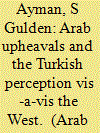

|
|
|
|
|
| Publication |
2013.
|
| Summary/Abstract |
The article argues that Turkey's perception of the West has been heavily influenced by its idealized identity. After evaluating the circumstances under which this idealized identity began to weaken, it shows how the images of the US and Europe have started to get compartmentalized and Israel separated from the image of the West. The article explains the relationship between the continuing process redefining Turkey's "personal identity" and its growing interest in the Middle East. The transformation process that Turkey is passing through is critically important in understanding the way in which Turkey has been affected by the upheavals and is reacting to the new developments in the region. In this vein the article highlights the interaction between power considerations and aspirations to re-define identity at home and abroad.
|
|
|
|
|
|
|
|
|
|
|
|
|
|
|
|
| 5 |
ID:
139254
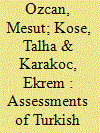

|
|
|
|
|
| Summary/Abstract |
Using original public-opinion polls and elite interviews conducted in 2012, this article analyzes the perceptions of Turkish foreign policy regarding the Arab Uprisings and the Syrian conflict in three Middle Eastern countries, Egypt, Iraq and Iran. It finds that ethnic, sectarian and religious groups in these three countries vary significantly in their views on Turkish foreign policy regarding both the Arab Uprisings and the Syrian conflict, although the same identity-related factors have a less salient effect at the elite level. The findings also suggest that the intersection of ethnicity and sect shapes people's attitudes toward Turkish foreign policy in Iran and Iraq. Sunnis, except for Kurds in Iran and Iraq, tend to have a positive view of Turkish foreign policy, while Shia Turkomans in Iraq tend to have a negative one.
|
|
|
|
|
|
|
|
|
|
|
|
|
|
|
|
| 6 |
ID:
087004
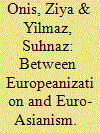

|
|
|
|
|
| Publication |
2009.
|
| Summary/Abstract |
Focusing on Turkish foreign policy in the post-Cold War era, this paper argues that the period can be divided into three distinct phases: an initial wave of foreign policy activism in the immediate post-Cold War context; a new or second wave of foreign policy activism during the Justice and Development Party (Adalet ve Kalk?nma Partisi, AKP) government era with a strong emphasis on Europeanization; and the more recent tension between Europeanization and Euro-Asianism. This paper argues that during the AKP era Turkey maintained considerable continuity in terms of foreign policy activism and a multilateral approach to policymaking. Yet at the same time, a certain discontinuity or rupture can be identified starting in the middle of the first AKP government's reign, signifying a shift from a commitment to deep Europeanization to loose Europeanization along with a parallel shift to a soft Euro-Asianism. Ultimately, the interaction between an intricate set of priorities on the domestic and international fronts will determine the future path of Turkish foreign policy.
|
|
|
|
|
|
|
|
|
|
|
|
|
|
|
|
| 7 |
ID:
173917
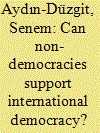

|
|
|
|
|
| Summary/Abstract |
In recent years, there has been a rise of interest in the concept of autocracy promotion, with scholars questioning whether the efforts by authoritarian governments to influence political transitions beyond their borders are necessarily pro-authoritarian. An extension of this question is whether some authoritarian governments may at times find it in their interest to support democracy abroad. This article aims to answer this question by focusing on the case of Turkey. It argues that, despite its rapidly deteriorating democracy since the late 2000s, Turkey has undertaken democracy support policies with the explicit goal of democratic transition in the Middle East and North Africa (MENA) region during the Arab Spring and, while not bearing the intention of democratic transition, has employed democracy support instruments in the form of state-building in sub-Saharan Africa since 2005 to the present day. Based on original fieldwork, the article finds that non-democracies can turn out as democracy supporters, if and when opportunities for strategic gains from democratisation abroad arise. The article further suggests that even in those cases where strategic interests do not necessitate regime change, a non-democracy may still deploy democracy support instruments to pursue its narrow interests, without adhering to an agenda for democratic transition.
|
|
|
|
|
|
|
|
|
|
|
|
|
|
|
|
| 8 |
ID:
146660
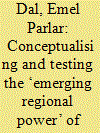

|
|
|
|
|
| Summary/Abstract |
Turkey has thus far been generally neglected in most IR studies on power categorisations, such as middle or middle-range power, regional power or rising/emerging power, despite its rising regional power status in the past decade. This paper attempts to understand Turkey’s regional power together with its rising power status using an integral approach. In doing so, it empirically tests whether or not Turkey fits Daniel Flemes’s ‘regional power’ category, which seems to be proposing a more complete and integral framework through the fulfilment of four basic preconditions: claim to leadership; possession of necessary power resources (material and ideational); employment of material, institutional and discursive foreign policy instruments; and acceptance of leadership by third parties. Based upon these analytical tools, the article will discuss Turkey’s performance in creating a regional impact in its neighbouring regions of the Middle East, the Balkans and the Black Sea and Caucasus.
|
|
|
|
|
|
|
|
|
|
|
|
|
|
|
|
| 9 |
ID:
187482
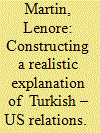

|
|
|
|
|
| Summary/Abstract |
U.S. support for the Syrian-Kurdish forces aligned with the PKK; U.S. declining to extradite Fethullah Gülen; Turkey’s purchase of the Russian S-400 missile defense system; and Turkey’s aggressive interference with natural gas exploration in the Mediterranean are four issues that have roiled U.S.-Turkish relations. This paper examines neorealist and constructivist explanations for these issues and determines that they provide a less than complete understanding of this troubled relationship. The paper then turns to middle level alliance theory and domestic factors favored by neoclassical realism to fill in the explanatory gaps.
|
|
|
|
|
|
|
|
|
|
|
|
|
|
|
|
| 10 |
ID:
145782
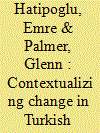

|
|
|
|
|
| Summary/Abstract |
The level of activism in Turkey's foreign policy has reached unprecedented levels during the country's modern history. This increased activism contrasts starkly with Turkey's characteristically traditional status quo orientation evinced during the Cold War. This study aims to establish a theoretical foundation to explain this multifaceted change in Turkish foreign policy. In doing so, it contends that the ‘two-good’ theory of foreign policy renders considerable analytical leverage for contextualizing recent changes in Turkish foreign policy. The theory posits that change in a country's foreign policy is contingent upon its willingness and capability to actively promote its interests. Furthermore, the ‘two-good’ theory postulates the method a country might employ to implement its foreign policy is a function of these two factors as well. The theory leads to two testable hypotheses regarding Turkish foreign policy. This study supports these hypotheses with qualitative and quantitative evidence.
|
|
|
|
|
|
|
|
|
|
|
|
|
|
|
|
| 11 |
ID:
187476
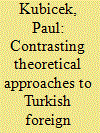

|
|
|
|
|
| Summary/Abstract |
This article introduces a Special Issue dedicated to applying international relations theories to Turkish foreign policy. More specifically, it contrasts structural or neo-realist approaches with ideational or constructivist ones, suggests general strengths and shortcomings in each, and briefly suggests how both might apply to TFP. It also introduces the eight substantive articles in the Special Issue.
|
|
|
|
|
|
|
|
|
|
|
|
|
|
|
|
| 12 |
ID:
153286
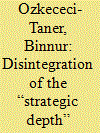

|
|
|
|
|
| Summary/Abstract |
By way of tracing a number of important developments in the last decade, this paper examines Turkey’s foreign policy under the leadership of the Justice and Development Party, with specific emphasis on the “strategic depth” doctrine. More specifically, after providing a very brief overview of Turkey’s foreign policy orientation between 1923 and 2002, the paper first discusses the basic principles of the “strategic depth” doctrine and then analyzes how three main issues – Islamization of Turkish foreign policy, the Arab Spring, and the increasing discrepancy between Turkey’s domestic politics and the image Turkey’s leaders wanted to present to the outside world – led to the disintegration of this doctrine.
|
|
|
|
|
|
|
|
|
|
|
|
|
|
|
|
| 13 |
ID:
132516
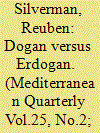

|
|
|
|
|
| Publication |
2014.
|
| Summary/Abstract |
The confrontation between Turkey's Justice and Development Party (AKP) and media mogul Aydin Dogan illustrates a major shift that has occurred in Turkey since the early 2000s. Dogan Holding is part of a traditional economic elite dominated by a number of large, coastal firms. The AKP is supported by a new generation of businessmen from Anatolia. This essay uses the conflict between the two to spotlight the competing networks of businessmen and politicians that dominate present-day Turkey.
|
|
|
|
|
|
|
|
|
|
|
|
|
|
|
|
| 14 |
ID:
121174
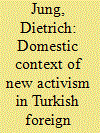

|
|
|
|
|
| Publication |
2012.
|
| Summary/Abstract |
The novelty of Turkish foreign policy is currently on everybody's lips.
With catchwords such as "soft power," "activism," or the assumption of a
new "eastern orientation," media pundits and scholars alike discuss the
transformation of Ankara's neighbourhood policy for which the minister of
foreign affairs, Ahmet Davutoglu, has coined the slogan of "zero-problem
policy" with Turkey's neighbours. There is no doubt that in comparison
with the rather hands-off approach toward the Middle East that was a core
element of the foreign policies of Turkey's Kemalist political elite, under
Prime Minister Recep Tayyip Erdogan the country has made its immediate
and more distant neighbourhood a field of foreign policy activism.
|
|
|
|
|
|
|
|
|
|
|
|
|
|
|
|
| 15 |
ID:
192931
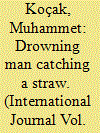

|
|
|
|
|
| Summary/Abstract |
In the mid-2010s Turkey-Russia relations gained a strategic dimension after the two nations began to work together in Syria and took bold steps to cooperate on defence and nuclear energy. This development was commonly regarded as a major shift in Turkish foreign policy. This article argues that the context in which the Turkey-Russia nexus operates is historically rooted. Since the nineteenth century, Russia almost has been the most critical threat to Turkey; and Turkey consistently sought to moderate this threat, mostly with Western assistance. But when Turkey either failed to subdue Russia or there was no significant threat, it would opt for rapprochement with Russia. An examination of the historical background of Turkey-Russia relations helps explain these nations’ contemporary dynamics with one another.
|
|
|
|
|
|
|
|
|
|
|
|
|
|
|
|
| 16 |
ID:
165299
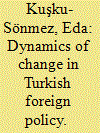

|
|
|
|
|
| Summary/Abstract |
This paper offers a contribution to the literature on Turkish foreign policy (TFP) change through quantitative analysis of Turkey’s foreign policy chronology under the ruling Justice and Development Party (Adalet ve Kalkınma Partisi, AKP) between January 2009 and October 2016. It utilizes an original dataset on foreign policy meetings which is then utilized to ascertain the alterations in their volume, direction and purpose. Through this analytical framework, the paper depicts the course of TFP orientations towards different countries and regions, as well as potential explanations of their dynamics. Among its many findings, the paper suggests that bilateral diplomatic activism in the late AKP period can be explained by motivating factors such as trade, geographical proximity and shared identity. Moreover, fluctuations in regional orientations of TFP can be associated with sudden and less calculated reactions to international or domestic political crisis situations.
|
|
|
|
|
|
|
|
|
|
|
|
|
|
|
|
| 17 |
ID:
151999
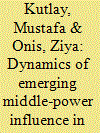

|
|
|
|
|
| Summary/Abstract |
This article attempts to understand the properties, potentials and limits of middle-power activism in a changing global order. Extensive debate on the rise of emerging powers notwithstanding, the potential contributions of emerging middle powers in regional and global governance, and the imminent challenges they face in their struggle for an upgraded status in the hierarchy of world politics, is an understudied issue. This study aims to fill this gap by offering a broad conceptual framework for middle-power activism and testing it with reference to the Turkish case. In this context, the authors aim to address the following questions: What kind of roles can emerging middle powers play in a post-hegemonic international system? What are the dynamics, properties and limitations of emerging middle-power activism in regional and global governance? Based on an extensive study of the Turkish case, the authors’ central thesis is that emerging middle powers can make important contributions to regional and global governance. Their ultimate impact, however, is not inevitable, but depends on a complementary set of conditions, which are outlined in this study.
|
|
|
|
|
|
|
|
|
|
|
|
|
|
|
|
| 18 |
ID:
152454
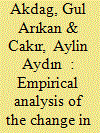

|
|
|
|
|
| Summary/Abstract |
The existing literature on Turkish foreign policy (TFP) asserts that under the rule of the Adalet ve Kalkınma Partisi (AKP), Turkey’s foreign policy shifted from caution and uni-dimensionality to relative activism and multi-dimensionality. This study aims to test these arguments through a systematic analysis of the international agreements ratified by the Turkish Parliament between 1984 and 2015. By looking at the number, content and signatory parties of these international agreements, it aims to empirically show the change in the activism, orientation and instruments of TFP. Using this original data set is not only used to trace the change under the AKP but also across all ruling governments that came to power between 1984 and 2015.
|
|
|
|
|
|
|
|
|
|
|
|
|
|
|
|
| 19 |
ID:
187480
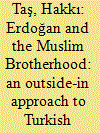

|
|
|
|
|
| Summary/Abstract |
Amidst multiple foreign policy flip-flops of the Turkish government, the Middle East is where observers agree most about the explanatory priority of ideational factors over realpolitik calculations. The assertive foreign policy activism to extend the country’s role in the region has largely been linked to the Islamist leanings of the ruling Justice and Development Party (AKP). This study revisits Turkey’s Middle East policy with a particular focus on the AKP’s relations with the Muslim Brotherhood (Ikhwan al Muslimin), which marked Turkish foreign policy formulation and implementation in multiple theatres from Yemen to Egypt to Libya. Using a neoclassical realist approach, it argues that the AKP’s ideological ties to the Ikhwan are significant for the availability of new resources but Turkish foreign policy behavior in the Middle East, including relations with the Ikhwan, reflects a grand strategy to respond to systemic and sub-systemic stimuli.
|
|
|
|
|
|
|
|
|
|
|
|
|
|
|
|
| 20 |
ID:
190819
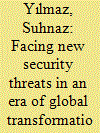

|
|
|
|
|
| Summary/Abstract |
Turkey's geopolitical position at the intersection of numerous conflict-laden regions has compelled Ankara to prioritize hard security concerns in defining its foreign and domestic policies. While these concerns will maintain their significance, new global threats and opportunities, particularly in energy security, climate change, and sustainability, necessitate a reconceptualization of security. This study posits that this new conceptualization must be more comprehensive by integrating these new challenges into conceptions security. After presenting pressing transformations in the energy security and climate change realm, the critical puzzle that the article will explore is Turkey's main challenges and opportunities in meeting its rapidly increasing energy needs on the one hand and facing mounting climate change and sustainability-related risks on the other. Moreover, the study will examine the domestic and foreign policy implications of these transformations in times of global changes and uncertainties.
|
|
|
|
|
|
|
|
|
|
|
|
|
|
|
|
|
|
|
|
|